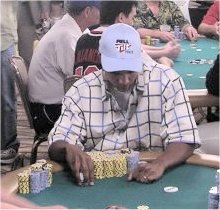|
|
 |
 |
|
|
 Welcome to the News desk. Welcome to the News desk.
|
 |
|
 |
| Full Tilt Poker shut down by Alderney regulators |
30/06/2011 |
|
 Richard Whitehouse Richard Whitehouse |
Alderney
regulators suspend Full Tilt's licence
Full Tilt fails to repay US
players
Phil Ivey boycotts World Series Of Poker
Gambling regulators on the Channel Island of Alderney
yesterday suspended the gambling license of Full Tilt Poker, halting the
company's online poker games and intensifying its legal problems in the U.S.
The Alderney commission said its internal investigation showed that
Full Tilt employees and associates operated contrary to its gambling laws. It
set a hearing on the matter for July 26 in London.
"The decision to
suspend the eGambling license was in the public interest and, because of the
seriousness and urgency of the matter, it required that immediate action be
taken ahead of the regulatory hearing," said Andre Wilsenach, the commission's
executive director.
Regulators from the island of Alderney visited the
Dublin offices of Pocket Kings Ltd., Full Tilt's software arm, and advised
employees there that the licenses for a series of affiliated companies in
Alderney had been suspended. The regulators demanded that Pocket Kings stop
providing software support, maintenance, marketing or other services to Full
Tilt.
The shutdown comes as Full Tilt is courting potential investors
and lenders in an effort to raise funding to pay back online poker players it
owes money, according to two people with knowledge of the situation. Alderney
regulators previously had told Full Tilt executives they were concerned the
company hadn't paid back $150 million owed to poker players in the U.S. and
were conducting an investigation into the funds. Company officials were
surprised by the shutdown because they believed they would instead be given a
warning.
Full Tilt has sparked animosity among online poker players
because, unlike PokerStars, it hasn't paid back U.S. players who had money in
company-held accounts since the Justice Department stopped the site from taking
bets in the U.S.
 |
| Phil Ivey at the
WSOP |
Phil Ivey, one of poker's
biggest superstars, says he skipped the World Series of Poker because he was
disappointed and embarrassed that his sponsor, Full Tilt Poker, hasn't paid
back player deposits after pulling out of the U.S. market.
PokerScout, a
website that tracks online poker traffic worldwide, showed zero users playing
on Full Tilt for real money Wednesday 29th June, down from an average of 9,000
at any given moment during the past week.
"There's a lot of anger out
there," said PokerScout owner Dan Stewart. "I think a lot of that comes from
the uncertainty of having your money locked up for an indefinite period of time
with no guarantee you're going to see it again."
In another move,
producers of The Poker Lounge, the Full Tilt-sponsored television show, have
abandoned plans to resume filming after the indicted operator failed to honour
its payments.
While it was thought the decision might have been taken in
response to the decision of the Alderney Gambling Control Commission to suspend
Full Tilt’s licences in the jurisdiction, a spokeswoman revealed a
non-payment of funds prompted the decision.
Full Tilt is hoping a cash
infusion can help it pay back the players, according to people with knowledge
of the situation. One possible backer is Jack Binion, a former casino executive
and member of a well-known Las Vegas casino family. He has drawn up term sheets
to provide a series of bridge loans, an investment or other
financing.
The Alderney commission's move prompted gambling regulators
in the Isle of Man to reaffirm the licensing status of PokerStars, the world's
largest online poker site that has faced the same legal trouble as Full
Tilt.
"PokerStars continues to demonstrate compliance with its license
conditions in the Isle of Man," the Isle of Man Gambling Supervision Commission
said in a statement. "PokerStars continues to offer withdrawals to any players
who wish to withdraw their funds, including players in the USA to whom
PokerStars does not currently offer real-money gaming.".
While certain
types of Internet gambling has been illegal in the United States since 2006,
online poker remains a multi-billion dollar industry with companies using a
variety of ways to flout the law, including locating their operations
offshore.
The effective US ban on Internet gambling has been challenged
as an unfair trade restriction at the World Trade Organization a number of
times with no response from the US State Department.
|
 |
|
| |
| |
|
 |

|
 |

